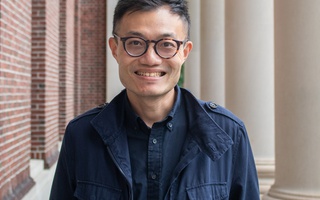
Harvard professor Ya-Wen Lei sat down with The Harvard Crimson to discuss her latest monograph, "The Gilded Cage: Technology, Development, and State Capitalism in China."
{shortcode-d2e441a2777e078a6e6bb54d103877fab09f030d}
Ya-Wen Lei, Professor in the Department of Sociology at Harvard University and an affiliate of the Fairbank Center for Chinese Studies as well as the Weatherhead Center for International Affairs, released her second monograph, “The Gilded Cage: Technology, Development, and State Capitalism in China,” on Nov. 21, 2023.
Lei’s latest book delves into China’s burgeoning techno-developmental regime and the grim consequences it holds for the country’s strained working class. The monograph itself is the culmination of years of fieldwork in China, with Lei spending weeks at a time in factories conducting interviews with workers and observing the ongoing effects of rapid economic development on her interviewees’ lives.
“What would happen to people whose employment was threatened by the transformation? And what does it mean for the society to have this kind of rapid development, digital economy, would that significantly improve people's life?” said Lei, exploring this “rapid transformation and its consequences” for different social classes in China.
After earning a Doctorate in Sociology from the University of Michigan, Lei served as a Junior Fellow at the Society of Fellows at Harvard from 2013 to 2016. Since 2016, Lei has taught a course called Contemporary Chinese Society at the Faculty of Arts and Sciences. Having “always been teaching China,” as Lei said, it soon became apparent to her that there was a lack of coverage on China’s development after the financial crisis. This observation and her students’ curiosity motivated her to write the monograph.
“There are not a lot of books in the post-financial crisis period. I didn’t find enough teaching material for me to teach students about what has happened in China,” she said.
Speaking about her teaching experience, Lei said“a lot of students asked me, ‘What happened after the financial crisis?’ I wasn't able to come up with good answers.”
Accompanying the new techno-developmental state of China, Lei noticed that even among her working class interviewees, people tended to have an overall positive view of the nation’s future. Parodying the four great inventions of ancient China, she noted how people have jokingly talked of the four great inventions of modern China — online shopping, mobile payment, shared bikes, and high speed trains.
“People see the country's rising, and they think the government has done a good job in terms of moving the country upward on the globe. And also they see the improvements in their material life, and they think it’s meaningful for them to sacrifice a lot of aspects of life,” Lei said.
However, it is undeniable that there are also voices of dissent against the workers' dismal conditions. The factory workers Lei interviewed expressed discontent with their work life. In her book, Lei includes many of her interviewees’ personal anecdotes and quotes their ambivalent feelings about their low rank in society and the disadvantages that accompany it.
“That’s the Chinese term they used — they told me they believe they live in a cage with some kind of visible fence because, in the factory, there are boundaries,” she said.
Several interviewees who had left factory life to find work elsewhere found that the novelty of physical freedom from the factory’s fences soon wore off.
“They think they transformed from a robot in a factory to a driverless vehicle, or wandering on the street without meaning. They feel they realize that now they live in a new cage with invisible fence,” Lei said.
Working for online platforms, such as food delivery services, these workers still endure harsh work conditions, dealing with inclement weather, strict punishment systems set by algorithms, and discrimination from other Chinese people.
For workers with families, those both inside and outside the factory face the added stress of their children being discriminated against by receiving limited access to quality education.
In her book, Lei discusses the difficulties that workers of all social ranks experience in this age of digital economy. Even engineers — as vital as they are in advancing the nation’s science and technology — are subject to being cut off by the strict standards of their company’s performance evaluation system. The monograph explores how this phenomenon is part of the bigger picture of the Chinese government’s agenda to eliminate obsolete businesses.
Many of the aforementioned social issues are downplayed by political leaders in order to keep the gilded surface of China’s techno-developmental state at the forefront of people’s minds. However, this is not to say Chinese people are unaware of these underlying problems or that they are blindly acquiescing to the state.
“People wanted to express their views. The problem is that the political condition didn't allow them to have that kind of discussion about humanity, about suffering, about meanings,” Lei said.
With regards to the political situation, she said “if there are more discussions, and then if there are more different kinds of solutions, then I think the situation would be better."
—Staff writer Nicole L. Guo can be reached at nicole.guo@thecrimson.com.
Recommended Articles
-
Some Tools to Make Shopping EasierIf you're one of those people who finds shopping week way more stressful than it should be, here are two tools to make your life a little easier.
-
 Thesis Writers Prepare for Looming Deadlines
Thesis Writers Prepare for Looming Deadlines -
 Harvard Academics Talk Industrial, Technological Development in China at Dean’s Symposium
Harvard Academics Talk Industrial, Technological Development in China at Dean’s Symposium -
 Fifteen Questions: David Yang on Chinese Authoritarianism, Political Economy, and Cookbooks
Fifteen Questions: David Yang on Chinese Authoritarianism, Political Economy, and Cookbooks -
 The Warren House: A Murder-Mystery History
The Warren House: A Murder-Mystery History













